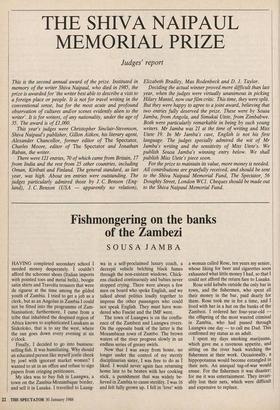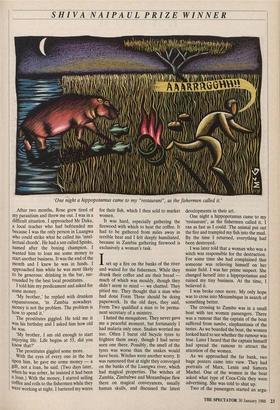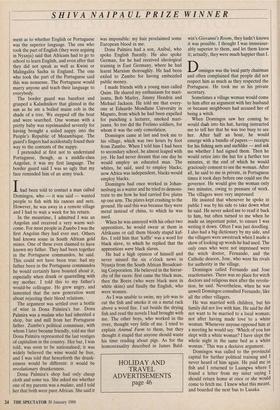THE SHIVA NAIPAUL MEMORIAL PRIZE
Judges' report
This is the second annual award of the prize. Instituted in memory of the writer Shiva Naipaul, who died in 1985, the prize is awarded for 'the writer best able to describe a visit to a foreign place or people. It is not for travel writing in the conventional sense, but for the most acute and profound observation of cultures and/or scenes evidently alien to the writer'. It is for writers, of any nationality, under the age of 35. The award is of £1,000.
This year's judges were Christopher Sinclair-Stevenson, Shiva Naipaul's publisher, Gillon Aitken, his literary agent, Alexander Chancellor, former editor of The Spectator, Charles Moore, editor of The Spectator and Jonathan Raban, the writer.
There were 121 entries, 70 of which came from Britain, 17 from India and the rest from 25 other countries, including Oman, Kiribati and Finland. The general standard, as last year, was high. About ten entries were outstanding. The judges particularly admired those by J. C. Benson (Eng- land), J. C. Benson (USA — apparently no relation), Elizabeth Bradley, Max Rodenbeck and D. J. Taylor.
Deciding the actual winner proved more difficult than last year, when the judges were virtually unanimous in picking Hilary Mantel, now our film critic. This time, they were split. But they were happy to agree to a joint award, believing that two entries fully deserved the prize. These were by Sousa Jamba, from Angola, and Simukai Utete, from Zimbabwe. Both were particularly remarkable in being by such young writers. Mr Jamba was 21 at the time of writing and Miss Utete 19. In Mr Jamba's case, English is not his first language. The judges specially admired the wit of Mr Jamba's writing and the sensitivity of Miss Utete's. We publish Sousa Jamba's winning entry below. We shall publish Miss Utete's piece soon.
For the prize to maintain its value, more money is needed. All contributions are gratefully received, and should be sent to the Shiva Naipaul Memorial Fund, The Spectator, 56 Doughty Street, London WC1. Cheques should be made out to the Shiva Naipaul Memorial Fund.
Fishmongering on the banks of the Zambezi
SOUSA JAMBA
HAVING completed secondary school I needed money desperately. I couldn't afford the schooner shoes (Italian imports with pointed toes and metal bells), boogie satin shirts and Travolta trousers that were de rigueur at the time among the gilded youth of Zambia. I tried to get a job as a clerk, but as an Angolan in Zambia I could not be fitted into the programme of Zam- bianisation; furthermore, I came from a tribe that inhabited the despised region of Africa known to sophisticated Lusakans as Sixkoloko, that is to say the west, where the sun goes down every evening at six o'clock.
Finally, I decided to go into business: selling fish. It was humiliating. Why should an educated person like myself jostle cheek by jowl with ignorant market women? I wanted to sit in an office and refuse to sign papers from cringing petitioners.
My idea was to buy fish in Luangwa, a town on the Zambia-Mozambique border, and sell it in Lusaka. I travelled to Luang- wa in a self-proclaimed luxury coach, a decrepit vehicle belching black fumes through the non-existent windows. Chick- ens clucked continuously and babies never stopped crying. There were always a few men on board who spoke English, and we talked about politics loudly together to impress the other passengers who could not speak English. They must have won- dered who Fascist and the IMF were.
The town of Luangwa is on the conflu- ence of the Zambezi and Luangwa rivers. On the opposite bank of the latter is the Mozambican town of Zumbo. The brown waters of the river progress slowly in an endless series of greasy swirls.
Now that I was away from home, no longer under the control of my sternly disciplinarian sister, I was free to do as I liked. I would never again face returning home late to be beaten with her cooking stick, a punishment that was widely be- lieved in Zambia to cause sterility. I was 16 and felt fully grown up. I fell in 'love' with a woman called Rose, ten years my senior, whose liking for beer and cigarettes soon exhausted what little money I had, so that I could not afford the return fare to Lusaka.
Rose sold kebabs outside the only bar in town, and the fishermen, who spent all their money in the bar, paid dearly for them. Rose took me in for a time, and I lived with her in a hut on the banks of the Zambezi. I ordered her four-year-old — the offspring of the most wanted criminal in Zambia, who had passed through Luangwa one day — to call me Dad. This confirmed my status as an adult.
I spent my days smoking marijuana, which gave me a ravenous appetite, and sitting on the river bank watching the fishermen at their work. Occasionally, a hippopotamus would become entangled in their nets. An unequal tug-of-war would ensue. For the fishermen it was disaster; for me it was entertainment. They invari- ably lost their nets, which were difficult and expensive to replace.
SHIVA NAIPAUL PRIZE WINNER
'One night a hippopotamus came to my "restaurant", as the fishermen called it.'
After two months, Rose grew tired of my parasitism and threw me out. I was in a difficult situation. I approached Mr Daka, a local teacher who had befriended me because I was the only person in Luangwa who could strike what he called his 'intel- lectual chords'. He had a son called Spinks, named after the boxing champion. I wanted him to loan me some money to start another business. It was the end of the month and I knew he was in funds. I approached him while he was most likely to be generous: drinking in the bar, sur- rounded by the best local prostitutes. I told him my predicament and asked for some money. 'My brother,' he replied with drunken expansiveness, 'in Zambia nowadays money is not the problem. The problem is how to spend it.' The prostitutes giggled. He told me it was his birthday and I asked him how old he was.
'My brother, I am old enough to start enjoying life. Life begins at 53, did you know that?'
The prostitutes giggled some more. With the eyes of every one in the bar Upon him, he gave me some money — a gift, not a loan, he said. (Two days later, When he was sober, he insisted it had been a loan.) With the money, I started selling coffee and rolls to the fishermen while they were working at night. I bartered my wares for their fish, which I then sold to market women.
It was hard, especially gathering the firewood with which to heat the coffee. It had to be gathered from miles away in terrible heat and I felt deeply humiliated, because in Zambia gathering firewood is exclusively a woman's task.
Iset up a fire on the banks of the river and waited for the fishermen. While they drunk their coffee and ate their bread — much of which was mouldy, though they didn't seem to mind — we chatted. They pitied me. They thought that a man who had done Form Three should be doing paperwork. In the old days, they said, Form Two qualified a man to be perma- nent secretary of a ministry.
I hated the mosquitoes. They never gave me a peaceful moment, but fortunately I had malaria only once. Snakes worried me too. Often I burnt old bicycle tyres to frighten them away, though I had never seen one there. Possibly, the smell of the tyres was worse than the snakes would have been. Witches were another worry. It was rumoured that at night they converged on the banks of the Luangwa river, which had magical properties. The witches of Zambia, Zimbabwe and Mozambique flew there on magical conveyances, usually human skulls, and discussed the latest developments in their art.
One night a hippopotamus came to my 'restaurant', as the fishermen called it. I ran as fast as I could. The animal put out the fire and trampled my fish into the mud. By the time I returned, everything had been destroyed.
I was later told that a woman who was a witch was responsible for the destruction. For some time she had complained that someone was relieving himself on her maize field. I was her prime suspect. She changed herself into a hippopotamus and ruined my tiny business. At the time, I believed it.
I was broke once more. My only hope was to cross into Mozambique in search of something better.
The crossing to Zumbo was in a small boat with ten women passengers. There was a rumour that the captain of the boat suffered from tumbo, elephantiasis of the testes. As we boarded the boat, the women looked hard to see whether the rumour was true. Later I heard that the captain himself had spread the rumour to attract the attention of the women.
As we approached the far bank, two huge posters came into view. They had portraits of Marx, Lenin and Samora Machel. One of the women in the boat asked what type of Coca-Cola they were advertising. She was told to shut up. Two of the passengers started an argu-
SHIVA NAIPAUL PRIZE WINNER
ment as to whether English or Portuguese was the superior language. The one who took the part of English (they were arguing in Nyanja) said that Africans had to go to school to learn English, and even after that they did not speak as well as Kwini or Malingalita Sacha in England. The one who took the part of the Portuguese said this was nonsense. The Portuguese would marry anyone and teach their language to everybody.
The border guard was barefoot and grasped a Kalashnikov that glinted in the sun as he ate a boiled maize cob in the shade of a tree. We stepped off the boat and were searched. One woman with a pretty baby was reprimanded severely for having brought a soiled nappy into the People's Republic of Mozambique. The guard's fingers had accidentally found their way to the contents of the nappy.
I pretended at first not to understand Portuguese, though, as a middle-class Angolan, it was my first language. The border guard said I was so ugly that my face reminded him of an army truck.
Ihad been told to contact a man called Domingos, who — it was said — wanted people to fish with his canoes and nets. However, he was away in a remote village and I had to wait a week for his return.
In the meantime, I admitted I was an Angolan and received a very warm wel- come. For most people in Zumbo I was the first Angolan they had ever met. Others had known some in South African gold mines. One of these even claimed to have known my father. They had been together in the Portuguese commandos, he said. This could not have been true: had my father been in the Portuguese commandos he would certainly have boasted about it, especially when drunk or quarrelling with my mother. I told this to my father's would-be colleague. He grew angry, and lamented that the new generation went about rejecting their blood relations.
The argument was settled over a bottle of wine in Dona Palmira's bar. Dona Palatka was a mulata who had inherited a shop, bar and mill from her Portuguese father. Zumbo's political commissar, with whom I later became friendly, told me that Dona Palmira represented the last vestiges of capitalism in the country. Her bar, I was told, was soon to be nationalised; it was widely believed the wine would be free, and I was told that henceforth the drunk- enness would be different: it would be revolutionary drunkenness.
Dona Palmira's shop had only cheap cloth and some tea. She asked me whether one of my parents was a mulato, and I told her that both were pure African. She said it was impossible: my hair proclaimed some European blood in me.
Dona Palmira had a son, Anibal, who spoke English fluently. He also spoke German, for he had received ideological training in East Germany, where he had learnt Marxism thoroughly. He had been exiled to Zumbo for having embezzled public money.
I made friends with a young man called Quim. He shared my enthusiasm for mari- juana, Bob Marley, Jimmy Hendrix and Michael Jackson. He told me that every- one at Eduardo Mondlane University in Maputo, from which he had been expelled for punching a lecturer, smoked mari- juana. So too did the Frelimo soldiers, for whom it was the only consolation.
Domingos came at last and took me to his village, which was two hours by foot from Zumbo. When I told him I had been to secondary school, he almost leaped with joy. He had never dreamt that one day he would employ an educated man. The whites, he said, used to employ blacks; now Africa was independent, blacks would employ blacks.
Domingos had once worked in Johan- nesburg as a waiter and he tried to demons- trate to me how he had carried five plates up one arm. The plates kept crashing to the ground. He said this was because they were metal instead of china, to which he was used.
When he was annoyed with his other two apprentices, he would swear at them in Afrikaans or call them bloody stupid kaf- firs. I told him that 'Ltd& was a word for black slave, to which he replied that the apprentices were black slaves.
He had a high opinion of himself and never missed the six o'clock news in Nyanja from the South African Broadcast- ing Corporation. He believed in the hierar- chy of the races: first came the black man, then the Boers (who were black men in white skins) and finally the English, who were women.
As I was unable to swim, my job was to cut the fish and smoke it on a metal rack above a wood fire. I sat beside the drying fish and read the novels I had brought with me. The other boys, who worked in the river, thought very little of me. I tried to explain Animal Farm to them, but they thought it stupid that anyone should waste his time reading about pigs. As for the homosexuality described in James Bald- win's Giovanni's Room, they hadn't known it was possible. I thought I was immeasur- ably superior to them, and let them know it; actually, they were much happier than I.
Domingos was the local party chairman and often complained that people did not respect him as much as they respected the Portuguese. He took me as his private secretary.
Sometimes a village woman would come to him after an argument with her husband or because neighbours had accused her of being a witch.
When Domingos saw her coming he would dash into his hut, having instructed me to tell her that he was too busy to see her. After half an hour, he would emerge with a bundle of papers — receipts for his fishing nets and suchlike — and ask me whether I had signed them. Then he would retire into the hut for a further ten minutes, at the end of which he would graciously consent to see the woman. After all, he said to me in private, in Portuguese times it took days before one could see the governor. He would give the woman only two minutes, owing to pressure of work. The villagers were very impressed.
He insisted that whenever he spoke in public I was by his side to take down what he said. He never asked me to read it back to him, but often turned to me when he made an important point, to ensure I was writing it down. Often I was just doodling. I also had a big dictionary by my side, and the villagers were awestruck when I made a show of looking up words he had used. The only ones who were not impressed were the witch doctor, Fernando, and the Catholic deacon, Jose, who were his rivals for authority in the village.
Domingos called Fernando and Jose reactionaries. There was no place for witch doctors and religious men after the revolu- tion, he said. Nevertheless, when he was unwell Domingos consulted Fernando, like all the other villagers.
He was married with children, but his family did not live with him. He said he did not want to be married to a local woman; not after having made love to a white woman. Whenever anyone opposed him at a meeting he would say: 'Which of you has slept with a white woman? I have slept the whole night in the same bed as a white woman.' This was a decisive argument.
Domingos was called to the provincial capital for further political training and I never heard of him again. He paid me in fish and I returned to Luangwa where I found a letter from my sister saying I should return home at once or she would come to fetch me. I knew what this meant, and boarded the next bus to Lusaka.




















































 Previous page
Previous page